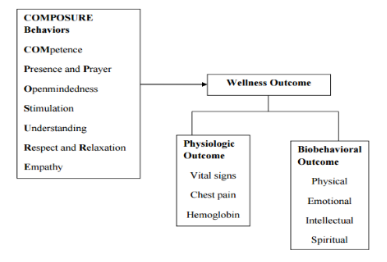Divingracia’s COMPOSURE Model
Dr. Carmelita Divinagracia
Former President of ADPCN
Dean of UERMMMC College of Nursing
Member of CHED’s Technical committee on Nursing Education
Has been lauded for developing the art and competency of teaching nursing.
Has been a clinic nurse, staff nurse, head nurse, instructor, assistant dean, and dean.
Expert in Research and Education
BSN, 1962 - UERMMMC
MSN, 1975 - UPM
DGN, 2001 - UPM
Recipient of the Anastacia Giron Tupas award given by PNA, 2008
ADVANCE NURSE PRACTICIONERS’ COMPOSURE BEHAVIOR AND PATIENT’S WELLNESS OUTCOME
Dr. Carmelita C. Divinagracia conducted a study to determine the effects of COMPOSURE behaviours of the advanced practitioner on the recovery of selected patients at the Philippine Heart Center. Behaviours include: competence, presence and prayer, open-mindedness, stimulation, understanding, respect and relaxation, and empathy.
Objective of the Study - Determine the effects of composure behavior of the advance nurse practitioner on the wellness outcome of the selected cardiac patients
Signifiance of the Study - Nursing as a healthcare profession would prove its worth of being at par in quality performance with other healthcare professionals.
Study Population - Adult Cardiac Patients admitted and confined at the Philippines Heart center, Coronary Care Unit.
DEFINITION OF TERMS
Advance Nurse Practitioners
BSN graduate
Licensed and has a clinical experience of at least 2 years
Has undergone special training
Set of behaviors or nursing measures that the nurse demonstrates to selected cardiac patients
Composure Behaviors
Composure behaviors - a condition of being in a state of well-being, a coordinated and integrated living pattern that involves the dimension of wellness.
Through the COMPOSURE behaviours of the nurse, holism is guaranteed to the patient.
As the COMPOSURE behaviours of novice nurses envelopes the orthopaedic patients as shown above, the researcher believe that there will be an essential improvement in the patient wellness outcome, may it be on physiologic and/or biobehavioral wellness outcome.
Patient Wellness Outcome
This refers to the perceived wellness of selected orthopaedic patients after receiving nursing care in terms of physiologic and biobehavioral.
Physiologic Wellness Outcome - This refers to the perceived wellness of selected orthopaedic patients after receiving nursing care in terms of vital signs, bone pain sensation, and complete blood count.
Biobehavioral Wellness Outcome - This refers to the perceived wellness of selected orthopaedic patients after receiving nursing care in terms physical, intellectual, emotional, and spiritual.
Physical - involves muscle strength, mobility, posture, gait exercise, and activity tolerance and cardio-respiratory endurance
Emotional - includes awareness, orientation, understanding of own and other personal feelings and ability to control and cope with emotions
Intellectual - refers knowledge and perception of a healthy self and ability to recognize the presence of risk factors and preventive measures
Spiritual - defined as development of inner self or one’s soul through a relationship with God and others.
 Knowt
Knowt

